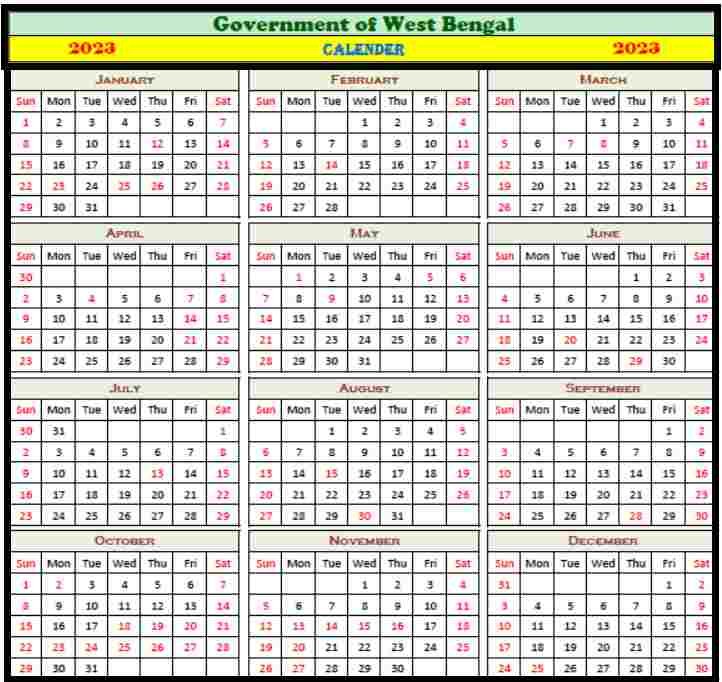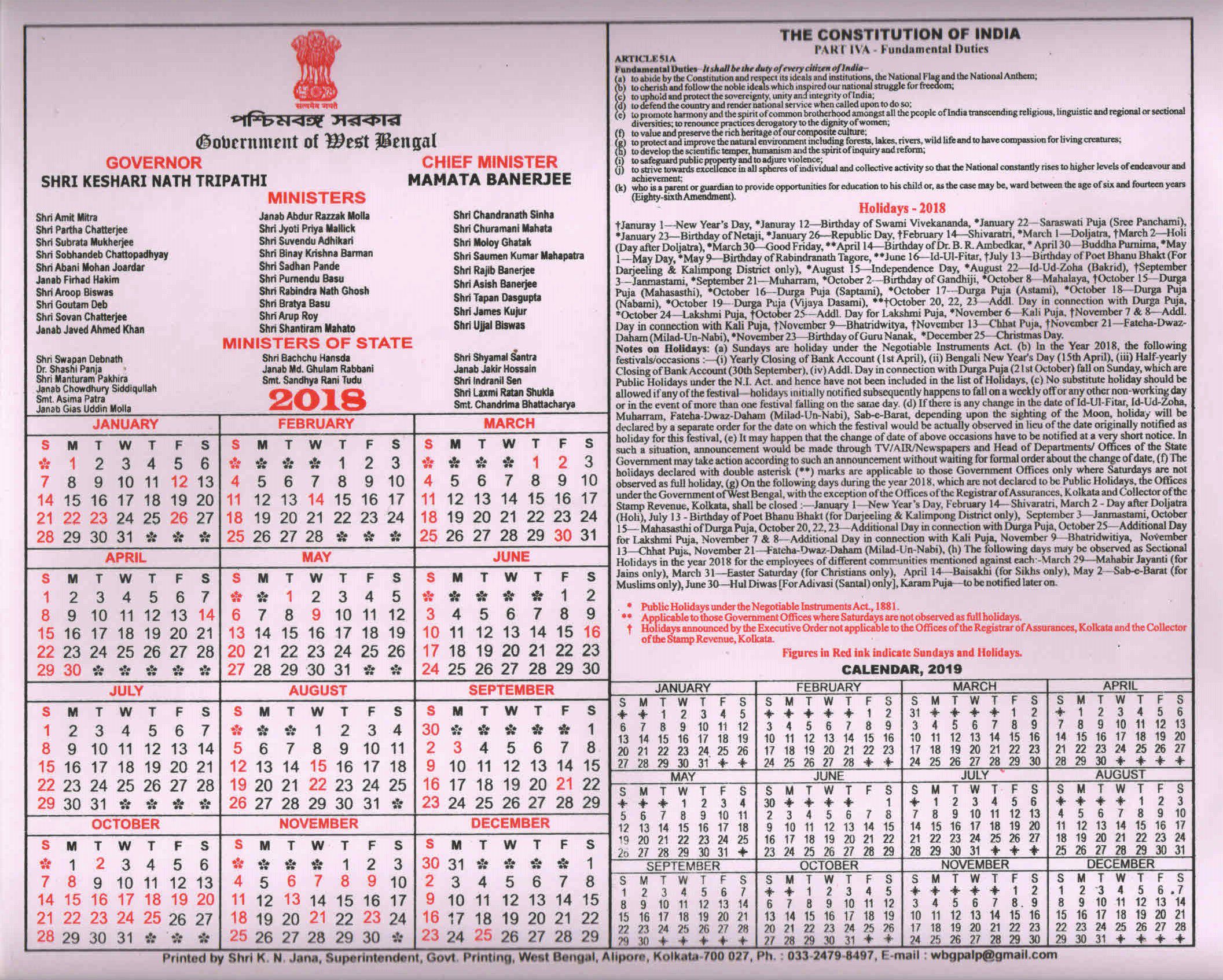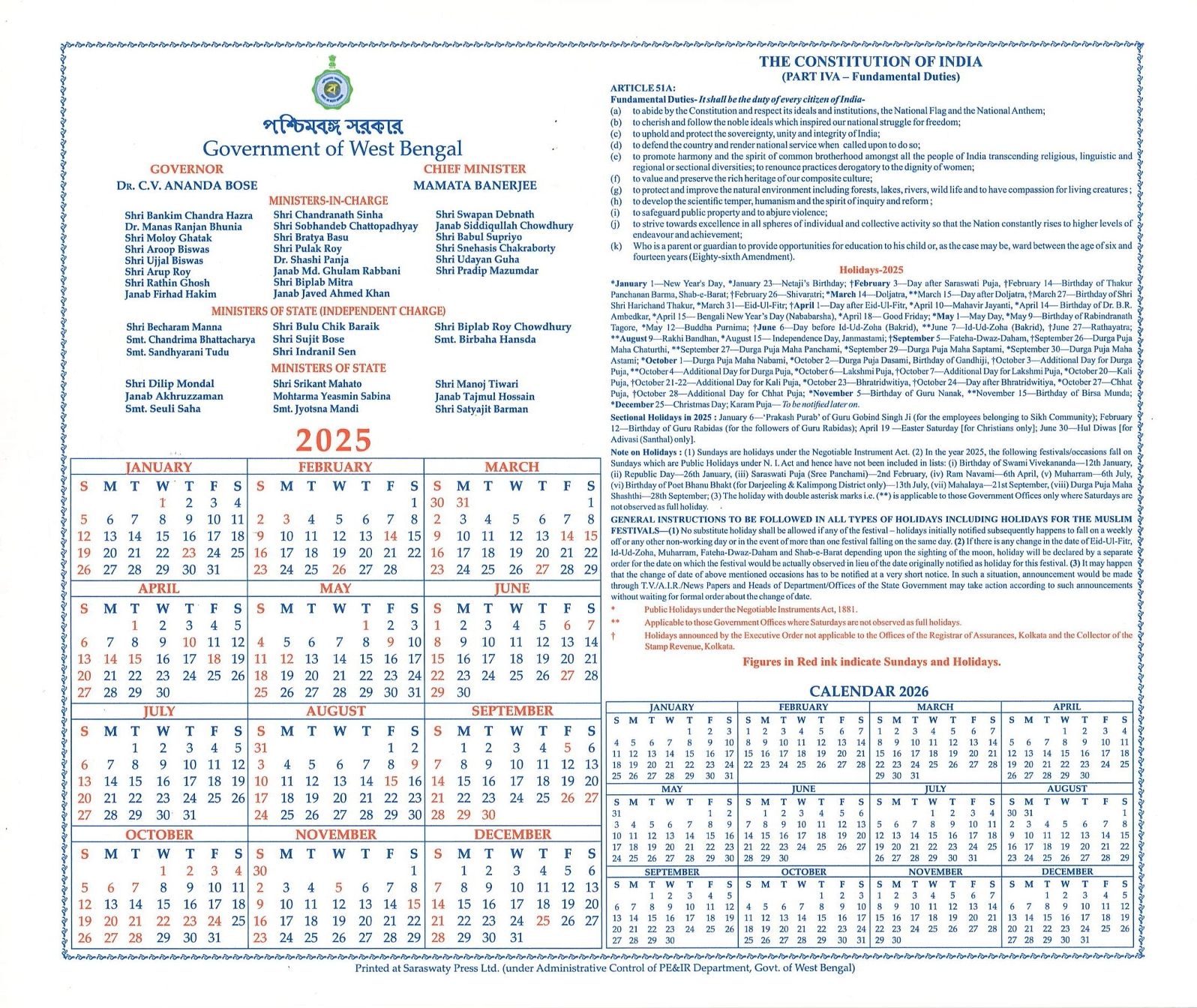
Introduction
calendar 2026 wb govt represents a significant subject within its field, encompassing a range of practices, traditions, or applications that shape daily life and broader cultural or professional landscapes. Understanding the West Bengal Government’s official calendar for 2026 provides clarity about its background, its present relevance, and the way it continues to influence various aspects of society. This comprehensive schedule of public holidays, restricted holidays, and significant dates serves as a foundational document for administrative planning, economic activity, educational scheduling, and personal arrangements across the state. Its publication is an eagerly anticipated event, offering a clear roadmap for the year ahead, impacting millions of lives and countless institutions.
Definition and Origin of the West Bengal Government Calendar
The West Bengal Government calendar for 2026 is an official document issued by the state administration, typically through its Finance Department or General Administration Department. It delineates the public holidays, restricted holidays, and other significant dates observed by all government offices, educational institutions, and often, by extension, many private sector entities within West Bengal. These holidays are declared under various legal provisions, including the Negotiable Instruments Act, 1881, for bank holidays, and specific state government notifications for other public and restricted holidays.
The origin of such official calendars is rooted in the need for standardized operational schedules across government departments and public services. Historically, the declaration of holidays has been influenced by a blend of religious festivals prominent in the region, national observances, and state-specific cultural events. West Bengal, with its rich cultural tapestry and diverse population, incorporates a wide array of festivals from various communities, ensuring inclusivity in its holiday declarations. The process usually involves a review of upcoming year’s astrological and astronomical charts to pinpoint exact dates for lunar and solar festivals, followed by consultation with various departments and community representatives to finalize the list. This ensures that the published schedule reflects both administrative necessity and cultural sensitivity, providing a predictable framework for the year.
Importance of the Official Calendar Today
The official calendar holds immense importance in contemporary West Bengal, extending far beyond mere administrative convenience. It serves as a critical planning tool for virtually every sector. For government employees, it dictates working days and leave planning, directly impacting work-life balance. Educational institutions, from primary schools to universities, rely on it to structure academic sessions, examination schedules, and vacation periods, ensuring continuity and coordination across the state’s vast educational network.
In the economic sphere, the declaration of public holidays has significant implications. Banks and financial institutions observe these dates, affecting transaction processing and market operations. Businesses, particularly those in retail, tourism, and hospitality, plan their operations, staffing, and marketing strategies around these breaks, anticipating shifts in consumer behavior. Industries with continuous operations, such as manufacturing, also factor in these non-working days for production scheduling and supply chain management. Furthermore, the calendar plays a crucial role in public life, enabling citizens to plan personal events, family gatherings, and travel, particularly during extended holiday periods. Its clarity minimizes confusion and ensures a coordinated approach to public and private activities, fostering social harmony and operational efficiency.
Benefits of the West Bengal Government Calendar
The advantages derived from a clearly articulated government calendar are multifaceted and pervasive.
- Predictability and Planning: The most immediate benefit is the predictability it offers. Individuals, families, and organizations can plan their year with certainty, from scheduling vacations to organizing business operations. This foresight is invaluable for resource allocation and time management.
- Operational Efficiency: For government departments and public services, a standardized holiday schedule ensures uniform closure and reopening, streamlining administrative processes and avoiding confusion. This contributes to overall governmental efficiency.
- Economic Impact: While holidays mean temporary closures for some sectors, they often stimulate others. Tourism, hospitality, and retail sectors frequently experience surges in activity around long weekends and major festivals. Businesses can strategize promotions and staffing accordingly, potentially boosting local economies.
- Work-Life Balance: Declared holidays provide essential breaks for employees, promoting rest, recreation, and family time. This contributes to improved employee morale, reduced burnout, and overall well-being, which can, in turn, enhance productivity.
- Cultural Preservation: By officially recognizing and observing a diverse range of festivals, the calendar reinforces and celebrates the rich cultural heritage of West Bengal. It provides opportunities for communities to engage in traditional practices and rituals, fostering a sense of identity and belonging.
- Social Cohesion: Shared holidays and observances create communal experiences, bringing people together across different backgrounds. This collective participation in cultural events strengthens social bonds and promotes unity within the state.
Applications of the Official Calendar
The applications of the West Bengal Government’s official calendar are extensive and deeply integrated into the fabric of daily life and institutional functioning.
- Government Administration: All state government offices, departments, and public sector undertakings adhere strictly to the declared holidays for their operational schedules, staff attendance, and public service delivery.
- Education Sector: Schools, colleges, and universities across West Bengal use the calendar as the primary reference for academic terms, examination dates, admission periods, and student vacations. This ensures a consistent academic year structure statewide.
- Banking and Finance: Financial institutions, including public and private banks, observe the holidays declared under the Negotiable Instruments Act, impacting banking hours, transaction clearances, and stock market operations.
- Healthcare Services: While essential services like hospitals operate continuously, administrative offices within healthcare systems and certain non-emergency services adjust their schedules according to the official holiday list.
- Transportation: Public transport services, while generally operational, may adjust frequencies or schedules on major holidays, and citizens plan their travel around these dates, especially for long-distance journeys.
- Business and Commerce: Retail establishments, manufacturing units, and service industries utilize the calendar for workforce planning, inventory management, sales promotions, and client communication. Many businesses align their non-working days with the government’s public holidays.
- Personal and Family Planning: Individuals and families extensively use the calendar to plan vacations, family gatherings, social events, and religious observances, maximizing the use of public holidays for personal pursuits.
- Event Management: Organizers of public events, cultural programs, and community festivals often schedule their activities to coincide with or avoid public holidays, depending on the nature of the event and target audience.
Challenges and Future of the West Bengal Government Calendar
While the official calendar provides immense benefits, its formulation and application are not without challenges, and its future is likely to evolve with technological and societal shifts.
One significant challenge lies in balancing the diverse cultural and religious demands of a multicultural state like West Bengal. Ensuring representation for various communities’ festivals while keeping the total number of holidays manageable is a continuous balancing act. There can also be complexities in accommodating specific local festivals that might not warrant a statewide holiday but are deeply significant to particular regions. Occasionally, last-minute changes or clarifications to the holiday list can cause administrative disruptions and public inconvenience, though such instances are rare.
The future of the official calendar is likely to be shaped by increasing digitization and the demand for greater flexibility. Integration with digital platforms, such as official government apps or online portals, could make the calendar more accessible and allow for real-time updates. The rise of flexible work arrangements and remote work might also prompt a re-evaluation of how holidays are observed, especially for sectors not directly reliant on physical office closures. There could be a trend towards more dynamic calendar management, potentially offering localized holiday options or a system where employees can choose a certain number of restricted holidays from a broader list, enhancing personal autonomy while maintaining core public observances. Furthermore, as environmental concerns grow, there might be considerations for integrating "green holidays" or days dedicated to environmental awareness into future calendars. The emphasis will likely remain on providing a clear, equitable, and adaptable framework for the state’s annual schedule.
FAQs about the West Bengal Government Calendar
Q1: What is the West Bengal Government calendar for 2026?
The West Bengal Government calendar for 2026 is an official notification detailing all public holidays, restricted holidays, and significant dates to be observed by state government offices, educational institutions, and other public bodies throughout the year.
Q2: Why is the West Bengal Government calendar important?
It is crucial for standardized planning across government administration, education, banking, and business sectors. It provides predictability for citizens, facilitates economic activity, promotes work-life balance, and helps preserve the state’s diverse cultural heritage.
Q3: What are the main benefits of the West Bengal Government calendar?
Key benefits include enhanced predictability for planning, improved operational efficiency for institutions, positive economic impacts on certain sectors, better work-life balance for employees, cultural preservation through festival observance, and strengthened social cohesion.
Q4: How can the West Bengal Government calendar be applied in daily life?
It is applied for scheduling academic sessions, planning personal vacations, managing business operations, coordinating banking transactions, and organizing public events, ensuring that individuals and organizations can plan their activities around official non-working days.
Q5: What challenges are associated with the West Bengal Government calendar?
Challenges include balancing diverse cultural and religious demands, managing the total number of holidays, accommodating specific local festivals, and the occasional need for last-minute adjustments, which can cause minor disruptions.
Tips for Utilizing the West Bengal Government Calendar
- Understand the fundamentals: Familiarize oneself with the distinction between public holidays (mandatory closure) and restricted holidays (optional leave days) to plan effectively.
- Focus on practical use: Integrate the calendar into personal and professional planning tools, such as digital calendars or physical planners, to ensure all key dates are noted.
- Stay updated on new trends or research: Regularly check official government websites or reliable news sources for any amendments or additional notifications regarding the holiday list.
- Avoid common mistakes: Do not assume that all private sector entities will observe every government holiday; verify with individual organizations regarding their specific holiday policies.
- Adopt a long-term approach: Use the calendar at the beginning of the year to map out major events, travel plans, and business strategies, allowing for proactive scheduling and resource management.
Conclusion about the West Bengal Government Calendar
The West Bengal Government calendar for 2026 continues to hold profound importance, serving as an indispensable framework for the state’s administrative, economic, educational, and social life. It reinforces cultural, professional, and personal significance by providing a structured approach to time and activity. While challenges in its formulation and implementation persist, particularly in balancing diverse community needs and adapting to modern work paradigms, its overarching benefits in fostering predictability, efficiency, and social harmony significantly outweigh these complexities. The official calendar remains a central element of progress and relevance, ensuring that West Bengal continues to function cohesively and purposefully into the future, reflecting its vibrant heritage while embracing contemporary needs.







Leave a Reply